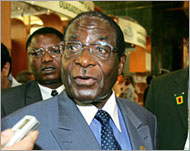Zimbabwe senate poll splits MDC
A serious split has opened up in Zimbabwe’s main opposition party after a number of its members defied their leader’s call to boycott senate polls.

The election has divided the Movement for Democratic Change, threatening to destroy the only group to have seriously challenged President Robert Mugabe’s 25-year rule.
Members of a faction of the MDC that supported participation in the senate polls did not attend a media briefing by Morgan Tsvangirai, the party leader.
Twenty-six MDC members defied his calls to boycott the polls, creating a rift in the party which has posed the stiffest challenge to Mugabe.
The split in the opposition assured Mugabe’s Zimbabwe African National Union-Patriotic Front (Zanu PF) of control of the chamber he abolished in 1990.
Mugabe pushed through a constitutional amendment earlier this year in what critics said was an attempt to increase his power to award jobs and perks in the ailing economy.
The ruling party is set for victory in senate elections after an election marked by widespread apathy and the boycott call.
The new house has no veto powers over legislation passed by the ruling party-dominated lower house.
Zanu PF set for victory
Preliminary returns on Sunday showed the ruling Zanu PF winning two seats in Harare, according to state radio.
 |
|
President Robert Mugabe’s Zanu |
It said the MDC won five seats in its stronghold of Bulawayo, despite calls by Tsvangirai for a poll boycott.
Tsvangirai told reporters at a briefing that the apathy vindicated the MDC leaders who supported the boycott.
“Our message was well received,” he said. “By staying away from yesterday’s polls, Zimbabweans issued a loud cry against unemployment, poverty, starvation and the crisis in the social services sector.”
He said the MDC had lost confidence in elections and would explore other “legitimate forms of pressuring the government to accept a new road map to change, premised on a new constitution”.
No veto powers
The ruling party’s candidates were unopposed for 19 of the senate’s 50 elected seats.
Mugabe appoints six other seats, and 10 are reserved for traditional leaders, selected by the Council of Chiefs.
State radio and independent observers reported low turnout countrywide, but did not specify figures.
There were no reports of political violence or intimidation.
There were more electoral officials than voters at many polling stations in the capital, Harare, on Saturday.
Scores of people lined up to buy sugar at supermarkets in northern and eastern parts of the city – dispersing angrily when stocks ran out at one store, witnesses said.
In an adjacent polling station, 13 electoral officials and police officers supervised a single voter casting his ballot.
‘Irrelevant’ poll
Rodrique Bhasera, a market trader, said:
|
“It’s irrelevant. It does nothing for me” |
“It’s irrelevant. It does nothing for me.”
Many also questioned the cost of adding a second chamber at a time of acute shortages of food, gasoline and other essentials.
The government estimates the Senate’s annual costs at about 60 billion Zimbabwe dollars ($6 million) in a country suffering its worst economic crisis since independence from Britain in 1980.
The seizure of thousands of commercial farms, coupled with erratic rains, has crippled Zimbabwe‘s agriculture-based economy.
About 3.2 million of Zimbabwe’s 12 million population were registered to vote. Mugabe did not cast a ballot because the ruling-party candidate in his constituency was unopposed.